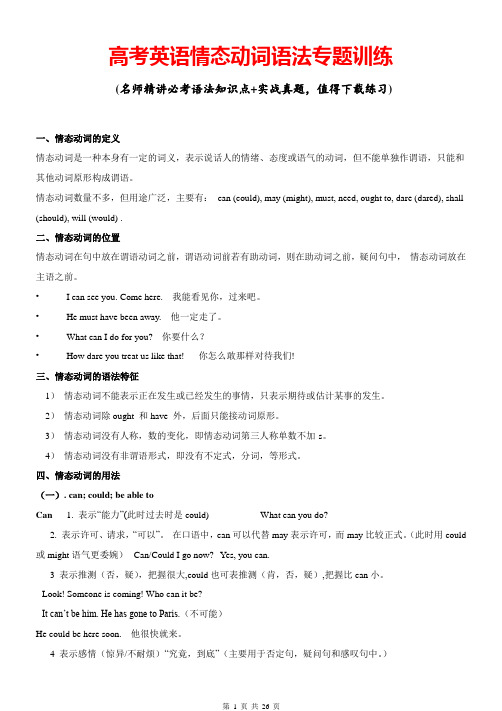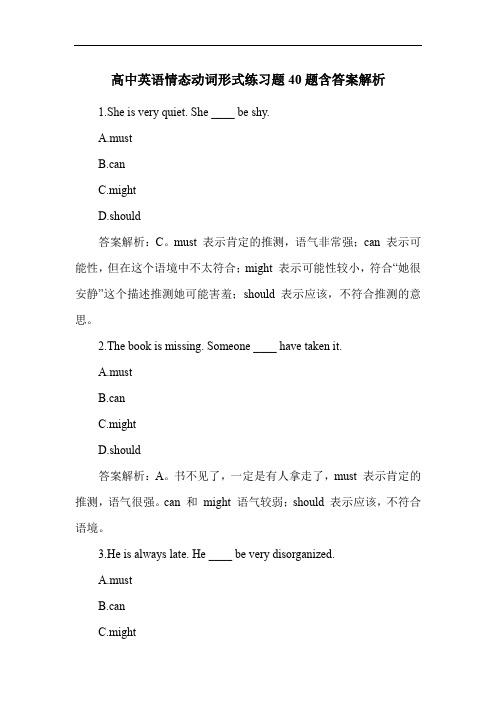普通高中英语情态动词专项训练(含详解)
高中英语情态动词形式练习题40题(带答案)

高中英语情态动词形式练习题40题(带答案)1. In the school library, you ______ keep quiet so as not to disturb others.A. canB. mayC. mustD. might答案:C解析:must表示必须,在图书馆里必须保持安静以免打扰他人。
can表示能够,有能力做某事,这里不是强调能力,所以A选项错误。
may表示可能或许,也可表示许可,但语气不如must强烈,这里需要表达一种规定,所以B选项不合适。
might是may的过去式,同样表示可能性或更委婉的许可,不符合语境,D选项错误。
2. For the school sports meeting, students who are good at running ______ participate.A. canB. shouldC. mustD. would答案:A解析:can表示有能力做某事,这里是说擅长跑步的学生能够参加运动会。
should表示应该,侧重于责任或义务,这里没有这种意思,B选项错误。
must表示必须,参加运动会不是强制的,C选项不符合。
would是will的过去式,通常表示过去的意愿或者用于虚拟语气等,D选项不符合语境。
3. You ______ ask the teacher for help if you don't understand the homework.A. canB. mayC. needD. must答案:A解析:can表示可以,在这里是说如果不理解作业可以向老师寻求帮助。
may也有可以的意思,但can的语气更直接,这里用can更合适。
need作情态动词时主要用于否定句和疑问句,这里是肯定句,C选项错误。
must表示必须,这里不是必须要向老师求助,D选项错误。
4. When we have a school trip, we ______ bring our own lunch.A. canB. mayC. shouldD. could答案:B解析:may表示许可,在这里是说我们在学校旅行时可以带自己的午餐。
高中英语情态动词形式练习题40题带答案解析

高中英语情态动词形式练习题40题带答案解析1.She ______ play the piano beautifully when she was only seven.A.canB.couldC.mayD.might答案解析:B。
“could”表示过去的能力,句中“when she was only seven”表明是过去的时间,所以用“could”。
“can”表示现在的能力;“may”和“might”表示可能性较小的推测,不符合题意。
2.You ______ borrow my book if you promise to return it on time.A.canB.mayC.mustD.should答案解析:A。
“can”在这里表示许可,“如果你承诺按时归还,你可以借我的书”。
“may”也有许可的意思,但语气比“can”弱;“must”表示必须;“should”表示应该,都不符合许可的意思。
3.He said he ______ speak three languages.A.canB.couldC.mayD.might答案解析:B。
“could”表示过去的能力,“said”表明是过去时态。
“can”是现在的能力;“may”和“might”表示可能性较小的推测。
4.Mom said I ______ go to the party if I finish my homework.A.canB.mayC.mustD.should答案解析:A。
“can”表示许可,“如果我完成作业,妈妈说我可以去参加聚会”。
“may”语气较弱;“must”是必须;“should”是应该。
5.She ______ swim very well last summer.A.canB.couldC.mayD.might答案解析:B。
“last summer”是过去的时间,“could”表示过去的能力。
“can”是现在的能力;“may”和“might”表示可能性较小的推测。
【英语】高三英语情态动词专项训练100(附答案)及解析

【英语】高三英语情态动词专项训练100(附答案)及解析一、单项选择情态动词1.he law is equally applied to everyone. No one _______ be above it.A.shall B.mustC.may D.need【答案】A【解析】【详解】考查情态动词。
句意:法律面前人人平等。
没有人能凌驾于法律之上。
A. shall用于第二、第三人称,则含有命令、警告、允诺或威胁的语气。
B. must(必须,一定)用于肯定句。
C. may(可以,能够)表允许时一般不与第三人称连用。
D. need (表示没有必要或询问是否有必要) 需要;故选A。
2.Frankly speaking, I am not sure whether I ________ this in the old days with that kind of equipment, which looks quite odd and ridiculous.A.should have done B.need have done C.would have done D.must have done 【答案】C【解析】【详解】考查情态动词+have done。
句意:坦率地说,我不确定在过去我是否会用这种设备做这件事,这看起来很奇怪和可笑。
A. should have done表示本应该做某事,而实际上没有做某事;B. need have done表示本来需要做某事而没有做;C. would have done虚拟语气,表示对过去事情的假设,意思是“本来会做”;D. must have done表示对过去事情的肯定推测,译成“一定做过某事”。
由“in the old days”可知,本句表示对过去事情的假设。
故选C项。
3.Most of the top leaders expressed a common desire at the UN conference, ______ that different cultures ______ coexist with tolerance.A.the one ; must B.the one ; should C.one ; must D.one ; should【答案】D【解析】【详解】考查替代和情态动词。
高中英语情态动词形式练习题40题(答案解析)

高中英语情态动词形式练习题40题(答案解析)1.She ____ know the answer.She always gets good grades.A.mustB.can'tC.mayD.might答案解析:A。
“She always gets good grades.”表明她总是取得好成绩,所以“一定”知道答案,must 符合语境。
can't 表示不可能;may 和might 表示可能,语气较弱,不符合此处语境。
2.____ I borrow your pen?A.MustB.CouldC.WouldD.Shall答案解析:B。
“borrow your pen”是请求,could 用于委婉地请求许可,符合语境。
must 表示必须;would 表示意愿或过去习惯;shall 用于第一人称征求对方意见,均不符合此处借笔的请求语境。
3.You ____ be careful when crossing the road.A.mustB.canC.mayD.could答案解析:A。
过马路时“一定”要小心,must 表示必须,符合语境。
can 表示能够;may 表示可能;could 表示能够( 语气更委婉),均不如must 强烈。
4.He ____ come to the party if he finishes his homework.A.mayB.mustC.can'tD.would答案解析:A。
“if he finishes his homework”表示一种可能性,may 表示可能,符合语境。
must 表示必须;can't 表示不可能;would 表示意愿或过去习惯,均不符合。
5.They ____ have gone on vacation.They haven't been at school for days.A.mustB.mayC.can'tD.could答案解析:A。
高考英语情态动词语法专题训练及答案(完整版)

高考英语情态动词语法专题训练(名师精讲必考语法知识点+实战真题,值得下载练习)一、情态动词的定义情态动词是一种本身有一定的词义,表示说话人的情绪、态度或语气的动词,但不能单独作谓语,只能和其他动词原形构成谓语。
情态动词数量不多,但用途广泛,主要有:can (could), may (might), must, need, ought to, dare (dared), shall (should), will (would) .二、情态动词的位置情态动词在句中放在谓语动词之前,谓语动词前若有助动词,则在助动词之前,疑问句中,情态动词放在主语之前。
•I can see you. Come here. 我能看见你,过来吧。
•He must have been away. 他一定走了。
•What can I do for you? 你要什么?•How dare you treat us like that! 你怎么敢那样对待我们!三、情态动词的语法特征1)情态动词不能表示正在发生或已经发生的事情,只表示期待或估计某事的发生。
2)情态动词除ought 和have 外,后面只能接动词原形。
3)情态动词没有人称,数的变化,即情态动词第三人称单数不加-s。
4)情态动词没有非谓语形式,即没有不定式,分词,等形式。
四、情态动词的用法(一). can; could; be able toCan 1. 表示“能力”(此时过去时是could) What can you do?2. 表示许可、请求,“可以”。
在口语中,can可以代替may表示许可,而may比较正式。
(此时用could 或might语气更委婉)--Can/Could I go now?--Yes, you can.3 表示推测(否,疑),把握很大,could也可表推测(肯,否,疑),把握比can小。
--Look! Someone is coming! Who can it be?--It can’t be him. He has gone to Paris.(不可能)He could be here soon. 他很快就来。
(英语)高三英语情态动词专项训练100(附答案)含解析

4. shall用于第二、第三人称,表示说话人给对方命令、警告、允诺或威胁。如:You shall fail if you don't work harder.(警告)He shall have the book when I finish reading.(允诺)He shall be punished.(威胁)
3.Our English teacher is considerate,helpful,and warm-hearted,but sometimes she________________ be angry at our silly mistakes.
A.shouldB.must
C.canD.shall
【解析】
【详解】
考查情态动词+have done。句意:“昨晚10点左右你给我打了电话,是吗?”“不,我没给你打电话。一定是别人干的。” must have done是对过去发生的动作最有把握的猜测,意思是“一定”,结合语境可知,我没有打电话给你,因此猜测一定有别人给你打了电话。故选A项。
9.Lack of sleep _______ lead to weakened immunity and memory, and also slow physical growth.
A.shallB.mustC.shouldD.can
【答案】D
【解析】
【详解】
考查情态动词辨析。句意:睡眠不足会导致免疫力和记忆力下降,还会减缓身体发育。A. shall将;B. must必须;C. should应该;D. can会,表示理论上或是逻辑判断上,用can,故选D。
最新高中英语情态动词专题讲解与专项练习(含答案)

高中英语语法之情态动词(一)情态动词的定义:情态动词表示说话人对某一动作或状态的态度。
(二)情态动词的特点: 1)有一定词义;2)不受主语人称和数的变化影响;3)与主要动词的原形(或称不带to 的不定式)一起构成谓语(除ought to 作固定词组看待)。
基本助动词与情态助动词最主要的区别之一是,基本助动词本身没有词义,而情态助动词则有自己的词义,能表示说话人对有关动作或状态的看法,或表示主观设想:What have you been doing since? (构成完成进行体,本身无词义)I am afraid I must be going. (一定要)You may have read some account of the matter. (或许已经)情态动词无人称和数的变化, 情态动词后面跟的动词需用原形,否定式构成是在情态动词后面加"not"。
个别情态动词有现在式和过去式两种形式, 过去式用来表达更加客气, 委婉的语气,时态性不强, 可用于过去,现在或将来。
情态动词属非及物动词,故没有被动语态。
He could be here soon. 他很快就来。
We can't carry the heavy box. 我们搬不动那箱子。
I'm sorry I can't help you. 对不起,我帮不上你。
除此之外,情态助动词还有如下词法和句法特征:1)情态助动词在限定动词词组总是位居第一: They need not have been punished so severely.2)除ought和used以外,其他情态动词后面只能接不带to 的不定式。
如果我们把ought to和used to看做是固定词组的话,那么,所有情态动词无一例外地只能接不带to 的不定式:We used to grow beautiful roses.I asked if he would come and repair my television set.3)情态动词没有非限定形式,即没有不定式和分词形式,也没有相应的动名词:Still, she needn't have run away.4)情态助动词用于第三人称单数现在时的时候,没有词形变化,即其词尾无-s 形式:She dare not say what she thinks.5)情态助动词之间是相互排斥的,即在一个限定动词词组中只能出现一个情态助动词,但有时却可以与have 和be 基本助动词连用:You should have washed the wound.Well, you shouldn't be reading a novel.6)情态助动词的“时”的形式并不是时间区别的主要标志。
高中英语情态动词形式练习题40题含答案解析

高中英语情态动词形式练习题40题含答案解析1.She is very quiet. She ____ be shy.A.mustB.canC.mightD.should答案解析:C。
must 表示肯定的推测,语气非常强;can 表示可能性,但在这个语境中不太符合;might 表示可能性较小,符合“她很安静”这个描述推测她可能害羞;should 表示应该,不符合推测的意思。
2.The book is missing. Someone ____ have taken it.A.mustB.canC.mightD.should答案解析:A。
书不见了,一定是有人拿走了,must 表示肯定的推测,语气很强。
can 和might 语气较弱;should 表示应该,不符合语境。
3.He is always late. He ____ be very disorganized.A.mustB.canC.might答案解析:A。
他总是迟到,肯定是非常没有条理,must 表示肯定的推测,语气强。
can 和might 可能性较小;should 表示应该,不合适。
4.The lights are on. Someone ____ be at home.A.mustB.canC.mightD.should答案解析:A。
灯亮着,肯定有人在家,must 表示肯定的推测,语气强。
can 和might 可能性较小;should 表示应该,不符合语境。
5.The test was very difficult. She ____ have passed it.A.mustB.canC.mightD.should答案解析:C。
考试很难,她可能通过了,might 表示可能性较小。
must 语气太强;can 表示可能性,但不太符合这个语境;should 表示应该,不符合推测的意思。
6.He looks very tired. He ____ have worked hard.A.mustB.canD.should答案解析:A。
- 1、下载文档前请自行甄别文档内容的完整性,平台不提供额外的编辑、内容补充、找答案等附加服务。
- 2、"仅部分预览"的文档,不可在线预览部分如存在完整性等问题,可反馈申请退款(可完整预览的文档不适用该条件!)。
- 3、如文档侵犯您的权益,请联系客服反馈,我们会尽快为您处理(人工客服工作时间:9:00-18:30)。
情态动词专项训练(一)1. “I thought you wouldn’t mind.” “Well, as a matter of fact I don’t, but you _____ me first.”A. should askB. should have askedC. must askD. must have asked2. “I called you yesterday. A woman answered, but I didn’t recognize her voice.” “Oh, it _____ my aunt Jean.”A. must beB. must have beenC. might beD. can have been3. That car nearly hit me; I ______.A.might be killedB.might have been killedC. may be killedD.may been killed4. It’s a very kind offer, but I really _____ accept it.A. mustn’tB. needn’tC. can’tD. don’t5. The police still haven’t found her, but they’re doing all they _____.A. mayB. canC. mustD. will6. You _____ practise the drums while the baby is sleeping.A. needn’tB. mightn’tC. mustn’tD. won’t7. You _____ him the news; he knew it already.A. needn’t tellB. needn’t have toldC. mightn’t tellD. mightn’t have told8. As she’s not here, I suppose she _____ home.A. must goB. must have goneC. might goD. might be going9. Are you still here? You ______ home hours ago.A. should goB. should have goneC. might goD. may have gone10. I _______ have met him a long time ago. Both his name and face are very familiar.A. mayB. canC. wouldD. should11. “Shall we go shopping?” “Sorry, we _______ buy anything now because none of the shops are open.”A. mustn’tB. needn’tC. can’tD. shouldn’t12. They often go to the restaurants for meals. They _____ be very poor.A. mustn’tB. can’tC. may notD. needn’t13. I didn’t see her in the meeting room this morning. She ______ have spoken at the meeting.A. mustn’tB. shouldn’tC. needn’tD. couldn’t14. He ______ the test again, in which case, his mother will be very disappointed.A. might failB. must have failedC. should failD. could have failed15. “Why didn’t she come to the meeting yesterday?” “I’m not so sure. She ______ ill.”A. should beB. should have beenC. must beD. might have been16. Why did you just sit and watch? You _______ me.A. could helpB. should helpC. could have helpedD. must have helped17. “You ______ your teacher for help. He is kind-hearted.” “Yes. A whole day _______.”A. can ask, will wasteB. must have asked, had wastedC. could have asked, was wastedD. shouldn’t have asked, would be wasted18. “Is there a flight to London this evening?” “There _______ be. I’ll phone the airport and find it out.”A. mustB. mightC. wouldD. can19. “Show me your permit, please.” “Oh, it’s not in my pocket. It ______.”A. might fall outB.could fall outC.should have fallen outD. must have fallen out20. “Look at these tracks. It _______ be a wolf.” “Don’t be so sure. I think it _______ be a fox.”A. must; couldB. may; mightC. need; mustD. could; need21. “Did Jim come?” “I don’t know. He _______ while I was out.”A. might have comeB. might comeC. mush have comeD. should have come1. 选B,should 后接动词完成式表示“本来应该做某事,结果未做”,此处含有责备之意。
2. 选B,对过去情况的肯定推测,宜用“情态动词 + 动词完成式”,再根据句意,可确定答案为B。
注:can 表示推测通常不用于肯定陈述句。
3. 选B,表示过去可能发生而实际上未发生的事,用might + 动词完成式。
若只是推测过去可能已经发生的事,则可用 may [might] + 动词完成式,如 He may [might] have gone.他可能已经走了。
4. 选C。
由句意可知。
5. 选B,do all one can 意为“尽力”或“竭尽全力”。
6. 选C,mustn’t 在此相当于can’t,且语气更强。
7. 选B,“needn’t + 动词完成式”的意思是:本来不必做某事,但实际上做了。
上句意思是“你本来不必告诉他这个消息的,因为他(当时)已经知道了”。
注意,句中 knew 为过去式。
8. 选B,must 后接动词完成式表示对过去情况的肯定推测,意为“一定已经做了某事”。
9. 选B,should 后接动词完成式表示“本来应该做某事,结果未做”。
10. 选A。
may have done sth 表示对过去可能发生的事进行推测,意为“可能曾经”。
11. 选C。
根据上下文的语境推知。
can’t 意为“不能”。
12. 选B。
根据上下文的语境推知。
can’t 表推测,意为“不不能”13. 选D。
couldn’t have done sth 表示对过去情况进行推测,意为“过去不可能发生过某情况”。
14. 选A。
根据下文的 will be 可知,“他考试再不及格”是将来的事,据此可排除B和D。
再根据语意,排除C。
15. 选D。
从时间上看,由于是昨天没来开会,所以推测他生病也应指昨天,故排除A和C。
从语境上看,既然上文说I’m not so sure,那么说明说话者对自己的推测没有很大把握,故选D。
16. 选C。
根据上文的过去时态可知,此句谈的是过去的事,故排除A和C。
根据语境排除D。
17. 选C。
couldn’t have done sth 结构在此表示责备,指过去本来可以做某事但实际上未做。
第二空填 was wasted,陈述的是过去的一事实。
18. 选B。
根据下文的I’ll phone the airport and find it ou t 可知,说话人对自己的推测没有很大把握,故选 might。
若选A,语气太强,不合语境;若选D,不合语法习惯,因为can 表推测通常不用于肯定陈述句中。
19. 选D。
既然“通行证现在不在口袋里”,那么它“掉出去”应发生在过去,故排除A和B。
比较选项C和D所表示的意思,选D更恰当。
20. 选A。
根据Don’t be so sure 可知前面一空应填must。
第二空填的could表示推测,虽为过去式形式,但表示现在意义,语气较委婉,它与表推测的 can 主要用于否定句和疑问句不同,它可以用于肯定陈述句。
21. 选A。
根据句中有关时态可知“他来”发生在过去,故排除B;根据I don’t know 可知选项C语气太肯定,不合适;选项D的意思是“本来应该来”,与语境不合。
